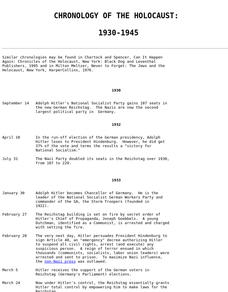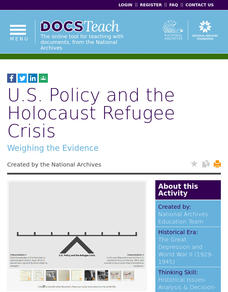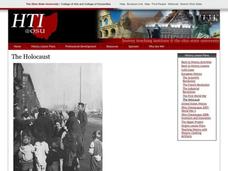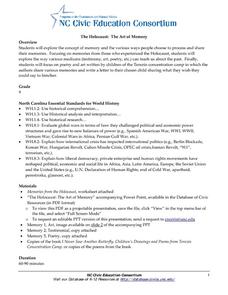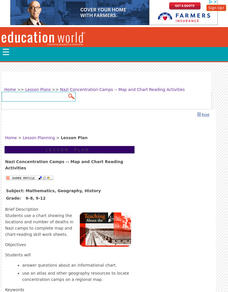Curated OER
Holocaust Denials
Do people deny that the Holocaust occurred? When posed with this question in class, high schoolers answer with a discussion on relativism, historical perspectives, and anti-Semitic historians. The presentation is full of information that...
Curated OER
Promote Tolerance on International Holocaust Remembrance Day
Delve into the history of Auschwitz to educate this generation about the Holocaust, genocide, and tolerance.
Weebly
Holocaust Diary Project
Here is a good interdisciplinary project that combines creative and narrative writing with studies of the Holocaust. Your young historians will compose a diary of experiences from the perspective of an individual living during the time...
Curated OER
Holocaust and Resistance
Students complete a unit of lessons that examine the Holocaust from the point of view of those who actively resisted the Nazis. They analyze a timeline, participate in a class debate, explore various websites, and write a letter.
Echoes & Reflections
Timeline of the Holocaust
An interactive timeline uses images, videos, primary source documents, and links to informational text to chronicle the history of the Holocaust from 1933-1945.
Constitutional Rights Foundation
U.S. Immigration Policy and Hitler’s Holocaust
Though the Statue of Liberty welcomes political refugees to her shores, the welcoming sentiment has not always been reflected in the American citizenry. High schoolers read about the regrettable period in United States history when the...
Curated OER
A Chronology of the Holocaust
A straightforward chronology of the Holocaust lists events from 1930 to 1945. Connects to a page with links to extensive resources and information about the Holocaust. Use as a resource for student inquiry into the Holocaust.
DocsTeach
U.S. Policy and the Holocaust Refugee Crisis
How did the United States respond to the Holocaust refugee crisis during World War II? The activity focuses on the United States' foreign policies and the arguments for and against offering assistance. Scholars analyze historical...
Curated OER
The Holocaust
Students comprehension widens on the subject of the Holocaust by focusing on two different, yet related, experiences of Jews in Europe during the Holocaust. Those being death camps and life in major ghettos. They trace both commonalities...
Carolina K-12
The Holocaust: The Art of Memory
Never Forget. As part of a study of the Holocaust, class members watch a PowerPoint about Terezin, read selections from I Never Saw Another Butterfly, Children's Drawings, and Poems from Terezin Concentration Camp, then craft their...
Curated OER
Holocaust: Voice of the Children
A picture is worth a thousand words. A visual account of the Nazi Empire, past and present scenes of WWII Concentration Camps, and the children of the Holocaust are presented in this slide show. Image heavy and graphic in nature, this...
Facing History and Ourselves
The Holocaust: Bystanders and Upstanders
Scholars analyze the role of bystanders during the Holocaust. The investigation explores the roles of the bystanders, upstanders, and rescuers with primary and secondary resources to determine actions taken—or not—and their implications...
Curated OER
Learning about the Holocaust
Students participate in learning about the Holocaust including the Japanese Internment Camps. They view the movie, "Schindler's List," in order to gain an even better understanding of the Holocaust. They develop a Power Point...
While They Watched
Teaching the Holocaust
What is the difference between prejudice and discrimination? Between collaborators and bystanders? Guilt and responsibility? Prompt learners to think critically about a very complex and textured topic with an innovative packet of materials.
Curated OER
Holocaust Studies: Five Poems by Dan Pagis
Teaching a unit on the Holocaust? Consider using the personal statements of Dan Pagis’s poetry to contrast with the more “distanced” historical accounts found in textbooks. Five poems, discussion questions, and background notes are...
Curated OER
The Holocaust: Concentration Camps
Tenth graders, after reading a variety of passages and watching a video on "Children Remember the Holocaust," explore the concept of brutality of deportation and analyze conditions in concentration and death camps. They review maps and...
Curated OER
Time Capsule - Jewish Children In Concentration Camps
Students explore personal characteristics of Jewish students in concentration camps and the ghetto and make a time capsule of events and photographs following survivors from the ghetto and concentration camps to freedom.
Curated OER
To Honor All Children from Prejudice to Discrimination to Hatred....to Holocaust, Part 1
Students analyze different perspectives of the history of the Holocaust. They experience primary and secondary sources along with pieces from literature, documentaries, songs and letters. A commitment of honor and dedication is expressed...
Curated OER
Holocaust Remembrance Day
Teachers could begin lessons about the Holocaust by having students read "The Diary of Anne Frank."
Curated OER
Holocaust
Seventh graders explore the geography of Eastern and Western Europe. They compare and constrast the culture of Jewish people from Eastern and Western Europe. They analyze deportation and confinement in concentration camps, using personal...
Curated OER
Holocaust Remembrance Week and the Chain of Causation
Here are activities and lessons for examining the "chain of causation" leading up to the Holocaust.
Curated OER
Nazi Concentration Camps -- Map and Chart-Reading Activities
Learners use an informational chart about Nazi concentration and death camps to complete a mapping activity and a chart-reading activity.
Curated OER
Life and Death in the Camps
Students state the difference between death camps and concentration camps used during the Holocaust. Using primary source documents, they summarize what life in the camp was like. They describe the final solution used by the Nazis.
Curated OER
The Holocaust in Art, Photography and Writing
Students explore paintings, photographs and writings about the Holocaust using the internet. Researching the various websites, they will discover different human experiences of Holocaust victims. After researching, students write about...








